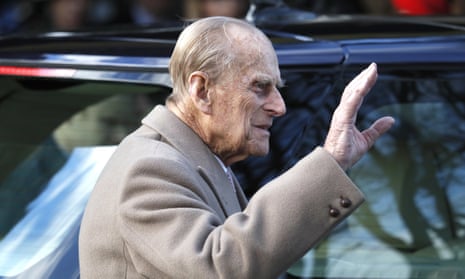So much is made of the harm that sections of the British media have done to the royals over the years that it often completely overshadows the terrible harm the royals do to the media. For something strange and awful seems to come over the industry when tasked with covering the monarchy: it becomes servile, oddly pious, nerdily preoccupied with such things as the dates of building restorations and the royal protocol on tights. People are often mean about the BBC’s sycophantic royal correspondent Nicholas Witchell, but his is a disease that infects anyone who touches his subject.
First, and perhaps worst, is the fixation on detail, which serves to make the country look like deranged stalkers convinced their victims are sending them secret love signals through the curtains. Take the reaction to the car crash in which the Duke of Edinburgh wasn’t injured: there were artist’s impressions of Philip in its aftermath, “fact files” about the vehicle he was driving, stories about the Queen being (as usual) driven to church (in a different car) “just days” after the accident, and what it might have meant that Philip wasn’t with her.
Or take the recent tabloid story that claimed to find the likeness of Princess Charlotte in the intricacies of Meghan, Duchess of Sussex’s knees. Or, the one about Meghan shutting a car door, which was reported along with commentary such as: “The Duchess of Sussex closing her own car door is yet another silent signal that she is going to be doing things her own way.” These are not the signs of a nation in a healthy relationship with its sovereign.
It isn’t just print – TV can’t handle the royals either. It’s partly the contradictory tone: sombre, reverent, Attenborough closing in on a family of leopards – with just a whiff of jovial condescension. It’s partly the array of “experts” and “insiders” providing such electrifying gossip as the fact that the Queen has a tremendous sense of duty.
But mostly it’s the voice, the one that everyone – from reporters outside the Lindo Wing to documentary narrators – must slip into when talking about the royals on television: bright, reassuring, the voice of a primary school teacher supervising an emergency evacuation. For this is the only voice in which it is possible to pull off the particular trick of royal commentary, in which you must relate incredibly mundane things as if desperately trying to deflect attention from dangerous national secrets bubbling beneath. This is not the voice of a journalist trying to reveal things so much as trying to conceal them, as indeed they often are: the main task of royal reporting being to make it seem as if there is news when there is not.
Can the media even claim to be holding the monarchy to account? The strange thing is that even critical stories about the royals are framed in reference to royal protocol, or the reputation of the palace.
True, some newspapers have run pieces criticising Philip for failing to apologise to the other people involved in the crash (although perhaps not with the vigour they would a non-royal public figure) and querying whether at the age of 97 “defiant Philip” should be driving without a seat belt so soon after his “miraculous” escape. But most of the questions raised in the press were similar to those you’d imagine being asked in Buckingham Palace’s comms room.
Should a replacement Land Rover have been delivered so quickly, or was that “bad for PR”? How should the palace best handle the three real victims of the car crash? Did it look bad that it was the Queen’s lady-in-waiting, and not Prince Philip, who left well wishes for Emma Fairweather, the woman who was injured in the collision – and in a voicemail at that? The institution is defended even as its members and their aides are ticked off for breaking its rules. Somehow the media has become a ferocious guardian of royal convention – a sort of Julian Fellowes figure, scolding Downton Abbey cast members for using the wrong fork.
Is this what the public wants from royal journalism? It seems unlikely. The BBC received thousands of complaints for over-covering the royal birth in 2013. And amid wall-to-wall royal coverage in the run-up to Harry and Meghan’s wedding last year, one survey found some two thirds of people weren’t interested in the event at all. In so far as the public approve of the monarchy, they tend to justify it as good for national morale, but I can’t believe the kind of attention the royals get in the media cheers anyone up – it is instead a rather depressing spectacle. If there was ever a reason to reconsider getting rid of the monarchy, as we build up to the birth of Meghan’s first child in April, it is to save our profession its self-respect.

